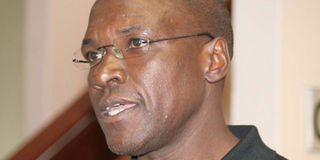Kimunya, CBK boss blamed over De La Rue deal

The chairman of the Public Accounts Committee (PAC) Dr Boni Khalwale. His committee has indicted Transport minister Amos Kimunya and Central Bank Governor Njuguna Ndung’u over the loss of Sh1.8 billion over the procurement of money-printing services August 1, 2012. FILE
A powerful parliamentary committee has indicted Transport minister Amos Kimunya and Central Bank Governor Njuguna Ndung’u over the loss of Sh1.8 billion over the procurement of money-printing services.
In a report tabled Wednesday in the House by the chairman of the Public Accounts Committee (PAC) Dr Boni Khalwale (Ikolomani), Mr Kimunya and Prof Ndung’u have to be held accountable for the loss.
The committee, which keeps tabs on government spending, wants Parliament to approve a resolution that the two are unfit to hold public office, given that their conduct is not in line with the chapter on Leadership and Integrity in the Constitution, and the Public Officers Ethics Act.
“The Ethics and Anti-Corruption Commission should investigate them with a view to taking appropriate legal action against them and recovering lost funds,” the MPs noted in their report.
This is the second time that Mr Kimunya, previously censured by the House for his role in the secret sale of the Grand Regency Hotel to Libyan investors, is again on the chopping board in the House.
Prof Ndung’u, who survived censure in the House earlier in the year for mismanaging the depreciation of the shilling, will once again bank on his allies in Parliament to have his name cleared.
Bribery claims
The committee appears to have put aside bribery claims, which surfaced when they were writing their report to the effect that one of the lawmakers in the committee had attempted to bribe his colleagues with Sh1 million to have the MPs tilt their findings and recommendations.
“No member of the committee held a dissenting view on any of the observations, findings and recommendations in this report,” the committee noted in its report.
The committee also found out that De La Rue was “overcharging” the government because when the money-printing contract was put to competitive bidding, the firm bid lower.
The crux of the matter is that Mr Kimunya, then the minister of Finance, cancelled a long-term contract of Sh3.8 billion for 1.71 billion pieces of banknotes, and decided to go for four short-term contracts that cost the taxpayer Sh5.6 billion for 1.49 billion pieces of banknotes.
Though De La Rue got the deal on May 4, 2006 for “for printing new generation banknotes, smaller in size and with advanced security features”, Mr Kimunya cancelled the contract in November 2007, saying that the government wanted to go into a joint venture with De La Rue.
Value for money
“Mr Kimunya directed the Central Bank to cancel a cheap contract even when his Ministry was not party to the contract and all the reasons he gave for the cancellation of the contract were found by the Committee to have been invalid,” the PAC report noted.
“Prof Ndung’u, on the other hand, did not make any effort to resist the directive from Mr Kimunya to cancel the contract. In so doing, he failed to protect the Bank’s independence and taxpayers’ interest. This was even notwithstanding the fact that since the Procurement and Disposal Act of 2005 came into force, Treasury had no business directing Central Bank of Kenya on procurement issues.”
The MPs said that even with the Treasury out on a joint venture, it failed to ensure that taxpayers’ got value for money.
“The committee finds that Treasury, which was responsible for the joint venture negotiations did not carry out proper or sufficient due diligence before agreeing on the stake acquisition and this was exposing the taxpayers to a loss it knew or ought to have known. The machines and technology used at the Ruaraka plant are analogue when modern technology is digital.
“The joint venture commits Central Bank of Kenya to a ten year currency supply contract with De La Rue which is in contravention of the Government procurement regulations and procedures as the Bank will be deprived the benefits of a fair price through a competitive procurement process. The joint venture is yet to be executed and the Committee will only give it the nod if the cited issues and others in the main report are addressed."




